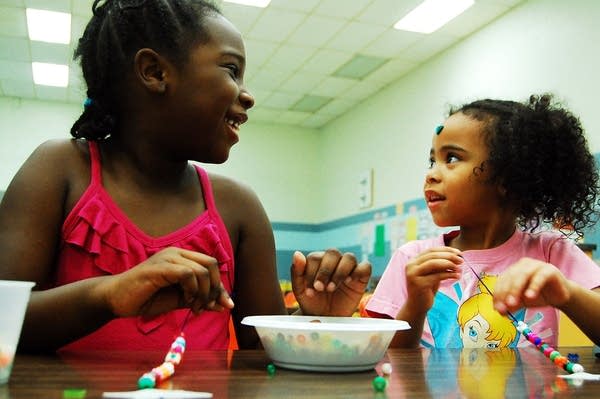Early childhood advocates worried about Race to the Top chances after session

For all the talk at the Minnesota State Capitol this year about early childhood education, supporters only won part of what they wanted. Legislators approved $4 million in scholarships for needy families, but they did not include a system to rate child care providers.
Now, some child care advocates are wondering whether that partial win might hurt Minnesota's chances later this year when it applies for a competitive federal grant called Race to the Top.
To see why advocates believe in ratings systems, one need only visit Amy Halloran's class in St. Paul's Frogtown neighborhood, which received high marks from the Minnesota Early Learning Foundation, a nonprofit organization that aims to prepare children for success in kindergarten.
Halloran uses a stuffed puppet named Luis to keep the children's attention as they learn today. A recent lesson was "what to do if you have a problem."
Create a More Connected Minnesota
MPR News is your trusted resource for the news you need. With your support, MPR News brings accessible, courageous journalism and authentic conversation to everyone - free of paywalls and barriers. Your gift makes a difference.
Halloran's class at the Wilder Child Development Center is key to preparing children for kindergarten, according to center director Judy Ohm.
"They have to be able to speak up for themselves and learn how to say, 'I'm mad' or 'I'm sad' or 'I need this' -- or how to ask," she said.
Ohm can market these and other lessons by telling families that hers is a four-star provider, thanks to the early learning foundation's ratings system called "Parent Aware."

"What I think Parent Aware also did was help parents learn that they can, and should, have expectations for how their children are cared for," said Ohm.
The ratings system was developed by the Minnesota Early Learning Foundation with private funding from several large corporations. Another part of its program provides scholarships for low-income families to send their children to early childhood education programs for free.
Ohm said the scholarships promote crucial stability, because children aren't removed from the center if parents encounter financial difficulties. At one point, scholarships covered one-third of Wilder's 70 enrolled children.
With the pilot program ending, groups like the Early Learning Foundation pushed lawmakers to enact the rating system and the scholarships statewide. But despite high-profile bipartisan support, the final education bill only included $4 million for scholarships and no rating system.
The resistance to the ratings came from groups like the Minnesota Family Council. Tom Prichard, the council's president, said too much regulation accompanies the rating system and amounts to government meddling.
"We all want kids to do better and be successful," Prichard said. "Is this the way to go about it? We would say no."
Advocates now worry about Minnesota's application this fall for federal Race to the Top funds. The competitive grant is focused on early childhood this year, and will divvy up $500 million among winning states.
The rules for that competition are not yet final, but the current draft lists a statewide ratings system as a requirement for applying.
"Our status right now, as it pertains to early childhood ed, is probably not as strong as we could have," said Duane Benson, the Early Learning Foundation's executive director.
Benson said federal officials will award creativity and accountability -- and without that ratings system, there's no accountability.
"That's an assurance that the public's money is being well spent," he said. "Absent of that, you could be spending it on anything."
Benson and others hope Gov. Mark Dayton will bypass lawmakers and create a rating system through an executive order. They hope the governor acts by Friday so they can get to work on the Race to the Top application.
In an email, Dayton's spokeswoman Katie Tinucci deflected questions about whether an order was coming, and instead restated the governor's commitment to early childhood education.
State Rep. Pat Garofalo, R-Farmington, who co-sponsored this year's final education funding bill, is not sure the governor can act alone.
"The key to the quality rating system was tying it to the scholarships, and that would require legislative action," Garafolo said. "The governor could not on his own ... say, 'You have to have this sort of rating in order to get this scholarship.' That's something we'll have to work on this summer and fall."
Garofalo notes the scholarships aren't available until next year, so Minnesota still has time to create a system. He adds it's more crucial to enact a quality system than to do everything too quickly just to meet a deadline for a federal grant.
So far, 36 states and Washington D.C. have told the U.S. Department of Education they intend to apply for Race to the Top this fall.
